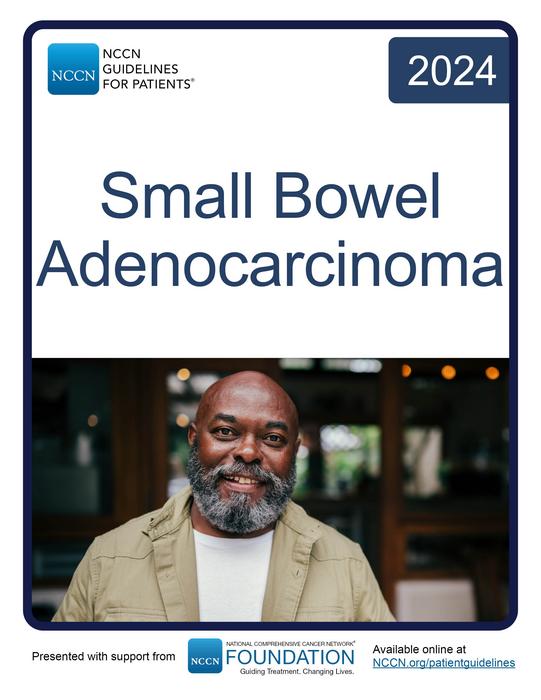PLYMOUTH MEETING, PA [May 20, 2024] — The National Comprehensive Cancer Network® (NCCN®) today announced publication of new NCCN Guidelines for Patients®: Small Bowel Adenocarcinoma. This free resource for people facing cancer and caregivers is focused on a rare cancer type that typically occurs in the small intestine, where routine screening is impossible, even for high-risk individuals. The small amount of patient information that exists for this cancer type tends to combine it with other cancers of the small intestine (such as sarcomas, neuroendocrine tumors, or lymphomas) despite very different treatment approaches and results.

Credit: NCCN
PLYMOUTH MEETING, PA [May 20, 2024] — The National Comprehensive Cancer Network® (NCCN®) today announced publication of new NCCN Guidelines for Patients®: Small Bowel Adenocarcinoma. This free resource for people facing cancer and caregivers is focused on a rare cancer type that typically occurs in the small intestine, where routine screening is impossible, even for high-risk individuals. The small amount of patient information that exists for this cancer type tends to combine it with other cancers of the small intestine (such as sarcomas, neuroendocrine tumors, or lymphomas) despite very different treatment approaches and results.
The NCCN Guidelines for Patients: Small Bowel Adenocarcinoma are now available for free download at NCCN.org/patientguidelines, thanks to funding from the NCCN Foundation®.
“People with rare diseases like small bowel cancer often have a difficult time finding trustworthy and thorough information about what they are going through,” said Michael Sapienza, CEO, Colorectal Cancer Alliance. “We appreciate NCCN’s commitment to sharing explanations of the latest evidence and expert consensus for common colon and rectal cancers and also for rarer cancers, like those involving the small intestine. This new guidance helps people with small bowel adenocarcinoma understand current treatment standards and know what questions to ask their doctor in order to make more informed decisions about their care.”
The NCCN Guidelines for Patients are based on the gold standard NCCN Clinical Practice Guidelines in Oncology (NCCN Guidelines®) used by health care providers worldwide to determine the best cancer treatment options for the best results. The patient versions offer the same evidence-based expert consensus recommendations in lay terms. including a helpful glossary, illustrations, and suggested questions to ask. They have won numerous awards for empowering people with cancer and their caregivers and are highly ranked for trustworthiness, according to independent studies.
“I’m excited to have information out there for the patients that has been vetted by subject matter experts. There’s not much for people with this disease, and everything helps,” said Katrina Pedersen, MD, MS, Mayo Clinic Comprehensive Cancer Center (previously with Siteman Cancer Center at Barnes-Jewish Hospital and Washington University School of Medicine), a Member of the NCCN Guidelines® Panel for Colon/Rectal/Anal Cancers and Small Intestine Adenocarcinoma, who played a key role in advocating for the creation of the clinical guidelines for small bowel adenocarcinoma. “I appreciate NCCN’s commitment to filling knowledge gaps in the rare disease space. I also hope these guidelines will help to raise awareness about small bowel adenocarcinoma and how much more we hope to learn about it in the future.”
Among the things that are known:
- Treatment differs from that for colon or rectal cancer in several ways, with the role of immunotherapy highlighted for patients with specific genomic profiles.
- For local (stage I–III) disease, the primary treatment involves surgery, including removal of nearby lymph nodes.
- Most metastatic patients are treated with systemic therapy.
- Small bowel adenocarcinoma is more common in people with Lynch syndrome or inflammatory bowel disease.
“Patients may not be aware that they could have a hereditary risk,” explained Al B. Benson, III, MD, Robert H. Lurie Comprehensive Cancer Center of Northwestern University, Chair of the NCCN Guidelines Panel for Colon/Rectal/Anal Cancers and Small Intestine Adenocarcinoma and Member of the NCCN Foundation Board of Directors. “That is important not only for the individual who has the disease, but it can also impact their relatives and offspring. If someone with small bowel adenocarcinoma has been demonstrated to have inherited risk, we want to make sure family members get genetic counseling and testing to see if they carry the same risk.”
NCCN Guidelines for Patients already exist for some of the other cancer types that are found in the intestines, including colon and rectal cancers, neuroendocrine tumors, and gastrointestinal stromal tumors (GIST). There are also prevention and supportive care guides covering topics like colorectal cancer screening and immunotherapy side effects.
Visit NCCN.org/patientresources to learn more about all of the different ways that NCCN and the NCCN Foundation help to inform and empower people facing cancer and their caregivers.
# # #
About the National Comprehensive Cancer Network
The National Comprehensive Cancer Network® (NCCN®) is a not-for-profit alliance of leading cancer centers devoted to patient care, research, and education. NCCN is dedicated to improving and facilitating quality, effective, equitable, and accessible cancer care so all patients can live better lives. The NCCN Clinical Practice Guidelines in Oncology (NCCN Guidelines®) provide transparent, evidence-based, expert consensus recommendations for cancer treatment, prevention, and supportive services; they are the recognized standard for clinical direction and policy in cancer management and the most thorough and frequently-updated clinical practice guidelines available in any area of medicine. The NCCN Guidelines for Patients® provide expert cancer treatment information to inform and empower patients and caregivers, through support from the NCCN Foundation®. NCCN also advances continuing education, global initiatives, policy, and research collaboration and publication in oncology. Visit NCCN.org for more information.
About the NCCN Foundation
The NCCN Foundation empowers people with cancer and their caregivers by delivering unbiased expert guidance from the world’s leading cancer experts through the library of NCCN Guidelines for Patients® and other patient education resources. The NCCN Foundation is also committed to advancing cancer treatment by funding the nation’s promising young investigators at the forefront of cancer research. For more information about the NCCN Foundation, visit nccnfoundation.org.



